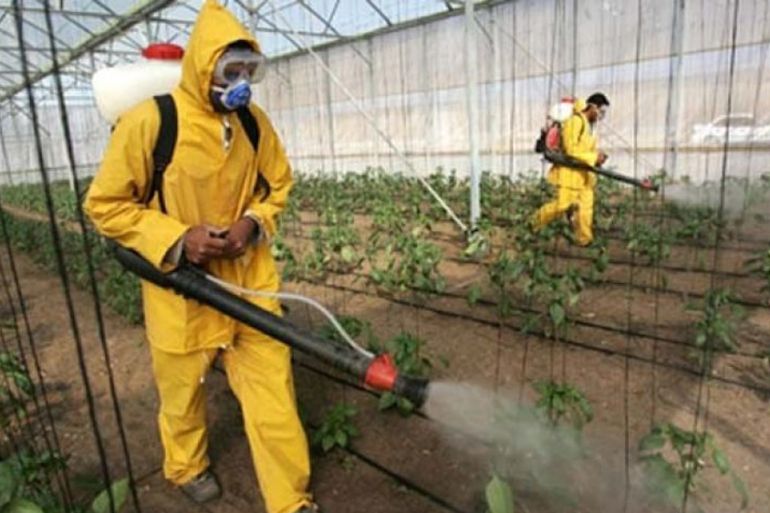UN: 200,000 die each year from pesticide poisoning
Report says pesticides are having ‘catastrophic impacts’ on human health and environment while failing to end hunger.

An average of about 200,000 people die from the toxic exposure of pesticides per year across the world, the United Nations says, calling for tougher global regulation of substances meant to control pests or weeds for plant cultivation.
The UN report – published on January 24 and which is being presented to the UN human rights council on Wednesday – said although pesticide use has been correlated with a rise in food production, it has had “catastrophic impacts” on human health and the environment.
Keep reading
list of 4 itemsMeasles outbreak kills at least 42 people in northeast Nigeria
What is behind the insulin shortage in the US?
Deaf Syrian boy hears for first time after life-changing operation
“Equally, increased food production has not succeeded in eliminating hunger worldwide. Reliance on hazardous pesticides is a short-term solution that undermines the rights to adequate food and health for present and future generations,” the report said.
It lists an array of serious illnesses and health issues with suspected links to pesticides, including cancer, Alzheimer’s and Parkinson’s disease, hormone disruption, birth defects, sterility, and neurological effects.
“In some countries, pesticide poisoning even exceeds fatalities from infectious diseases,” it said.
READ MORE: Study linking Roundup to serious disease fuels debate
The report blamed “systematic denial, fuelled by the pesticide and agro-industry” for “the magnitude of the damage inflicted by these chemicals”.
In an email statement sent to Al Jazeera in response to questions about the UN report, the United Kingdom’s Department of Environment, Food and Rural Affairs cited an unnamed government spokesperson as saying there is not enough proof to show that pesticides are harmful.
“The government makes decisions on pesticides based on science and we are committed to ensuring pesticides are available only when the scientific evidence shows they do not pose unacceptable risks to people and the environment,” it said.
According to the UN report, people can be exposed to dangerous levels of pesticides in a wide variety of ways, ranging from farmers who use it on their crops to babies drinking their mother’s contaminated breast milk.
|
|
| Hawaiians battle use of pesticides in crops |
“Few people are untouched by pesticide exposure. They may be exposed through food, water, air, or direct contact with pesticides or residues,” it said.
The UN report also highlighted profound effects on the environment.
“Pesticides sprayed on crops frequently pollute the surrounding ecosystem and beyond, with unpredictable ecological consequences. Furthermore, reductions in pest populations upset the complex balance between predator and prey species in the food chain.
“Pesticides can also decrease biodiversity of soils and contribute to nitrogen fixation, which can lead to large declines in crop yields, posing problems for food security.”
Jay Feldman, executive director of the Washington DC-based non-profit environmental organisation Beyond Pesticides, told Al Jazeera the $43bn organic food industry in the US is the best example of how the world does not need to rely on pesticides.
“There are non-toxic approaches that could meet food production goals, fight starvation, and not contaminate the environment,” said Feldman.
He highlighted how developing countries are much more susceptible to harmful impacts of pesticides because of a lack of regulation.
“Developing countries lack any infrastructure to ensure those handling the chemicals are using them to avoid causing dangerous levels of exposure or contamination.
“We don’t export nuclear technology to countries that we don’t trust would use it properly … so we should not be exporting hazardous materials or technologies to countries that we know do not have the proper system to ensure protection of public health and the environment.”
|
|
| Bangladesh: pesticide poisoning takes toll on farmers |
He also explained why organic farming is much more cost-effective and productive for farmers in developing countries.
“Pesticides are a very expensive technology. When we are talking about subsistence agriculture, relying on pesticides becomes an economic burden for farmers largely due to growing weed and pest resistance that requires farmers to keep purchasing stronger pesticides.
“However, with organic practices, we rely on natural ecosystem services which cycle nutrients in the soil naturally, making costly synthetic fertilizers unnecessary.
“And if we want to feed the world, the attention to soil biology, organic matter in soil, and natural nutrient recycling, are the only sustainable and cost-effective approaches.”
Agroecology
Paul Towers, a spokesman for Pesticide Action Network North America, an environmental group, told Al Jazeera about a growing movement towards “agroecology”.
“Agroecology is the science behind sustainable agriculture, from the ground up. It encourages democratic, decentralised decision-making by farmers and incorporates practical, low-cost and ecology-based technologies for productive farming.
“Not only do agroecological farming methods strengthen ecological and economic resilience in the face of today’s climate, water and energy crises, they offer a path forward for growing food to feed us all.”
|
|
| Argentinians link pesticides to illnesses |